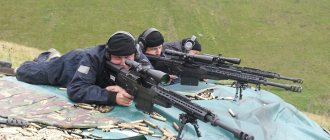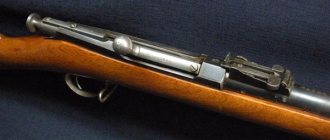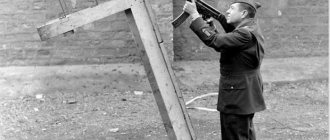| Ferguson rifle | |
| |
| Type: | rifle |
| A country: | Great Britain |
| Service history | |
| Years of operation: | 1776 |
| In service: | UK UK |
| Wars and conflicts: | American Revolutionary War |
| Production history | |
| Designed by: | 1770 |
| Years of production: | 1776—1778 |
| Total released: | about 1000 |
| Characteristics | |
| Weight, kg: | ~3,5 |
| Length, mm: | 1220—1520 (depending on modification) |
| Cartridge: | non-unitary; caliber - .615 |
| Caliber, mm: | .65 |
| Rate of fire, rounds/min: | 4-7 |
| Sighting range, m: | up to 300 |
| Type of ammunition: | breech-loading |
Ferguson rifle Ferguson rifle
Ferguson rifle
is
a 0.65″ (about 16.5 mm) breech-loading rifle developed by British Army Major Patrick Ferguson in the 1770s,
based on the earlier de la Chaumette system
(de la Chaumette)
.
One of the earliest breech-loading rifles, and among them, one of the first tested in combat conditions, which happened during the American Revolutionary War.
Despite its significant superiority over the then mass-produced army firearms, it did not become widespread due to the high complexity and duration of production, as well as the enormous cost, like other early breech-loading systems.
Device. History of creation and application
In its design, the Ferguson rifle was a fairly typical version of an early breech-loading weapon of the period before the invention of unitary cartridges, and in its design it repeated a number of earlier systems. Ferguson's main merit was, therefore, not the invention of a new principle of weapon operation, but an attempt to introduce the already existing system of breech-loading weapons in the army.
The rifle's bolt was made in the form of a transverse, vertically located plug, screwed from below into the breech of the barrel. The trigger guard served as a crank for unscrewing and tightening the plug. The thread on it had 11 turns and such a pitch that one full turn of the crank would completely lower the bolt, opening access to the barrel bore. After this, a bullet (standard English musket, 615 caliber) was rolled into the chamber drilled in the breech of the barrel, and a powder charge was poured behind it, and a little more gunpowder was poured in than was necessary for the shot. When closing, the bolt pushed excess gunpowder out, resulting in a precisely measured amount remaining in the barrel.
Thus, the key problem of obturation for early breech-loading weapons was solved in the Ferguson rifle, as in the earlier de la Chaumette, very simply and quite elegantly - through the use of a plug clogging the barrel bore at the back on a special gas-resistant thread, which served as an obturator. Moreover, the novelty in this case was precisely the vertical arrangement of the plug, which increased the ease of handling weapons, since long before that, systems of hand weapons and light artillery pieces were in some use, in which the plug was screwed into a thread made directly on the walls of the barrel bore in its breech. It is curious that [armor.kiev.ua/lib/artilery/03/047.gif artillery guns of such a system] are sometimes mentioned as the distant ancestors of modern piston-breech guns[1]; in the latter, to lock the barrel bore, threading is also used on the bolt body and in the bore breech channel, but it is made intermittently - the threading sectors alternate with smooth ones, which makes it possible to open and close the bolt faster, but does not provide obturation, as a result of which separate obturators are used in such guns , usually in the form of an elastic part that rings out when fired and clogs the barrel bore. In the Ferguson system, this problem was circumvented in a different, and very ingenious way - the use of a bolt in the form of a transverse plug made it possible to preserve the combination of the thread function both as a locking device and as a seal, significantly simplifying the design of the weapon and making it accessible to technologies at the level of the 18th century ; functional seals for piston valves appeared only in the 1860s, almost a century later.
The lock was a flintlock, and had a design traditional for that time, similar to the standard British military Brown Bess musket.
In total, to fire a shot, the shooter only had to turn the trigger guard, which served as a knob, one turn, insert a bullet into the barrel, add gunpowder, screw the bolt to its original position, putting the trigger on safety, pour gunpowder onto the lock shelf and cock the hammer.
An experienced shooter fired up to 7 aimed shots per minute from the Ferguson rifle, and it could be reloaded from any position, for example, lying down (although this was not very convenient), while a muzzle-loading weapon could only be reloaded while standing. Ferguson himself, while testing his rifle, maintained a rate of fire of 4 rounds per minute for 5 minutes, while at a distance of 200 yards (about 180 meters), unattainable for army muskets of that time, he made only three misses.
For comparison, the rate of fire of the then muzzle-loading rifles was about one shot every few minutes, since the bullet had to be “hammered” into the barrel with force so that it would fit the rifling. Muzzle-loading guns showed better results, but still, even in the hands of a virtuoso shooter, they fired no more than 6-7 shots per minute without aiming.
The combination of high rate of fire and effective firing range interested even the conservative British military. As an experiment, an entire detachment of riflemen (Experimental Rifle Corps), which was placed under his command, was armed with Ferguson rifles manufactured on government order in an amount (initially) of about 100 pieces. He successfully took part in a number of battles of the American Revolutionary War, among them the largest was the Battle of Brandywine Creek, in which the British under the command of General Howe completely defeated the American militia, suffering minor losses, but Ferguson himself was injured. According to legend, at one point in the battle he “held George Washington himself at gunpoint,” but, being a gentleman, did not shoot, because. Washington's back was to him.
After Brandywine Creek, an experienced detachment armed with rifles was disbanded due to the incapacity of its commander, and the rifles themselves were sent into storage. There is no reliable information about whether they were used to continue the war. Meanwhile, some of them subsequently “resurfaced” during the War between the North and the South as weapons for the southern militia, so they are likely to be used in battles in the southern United States. Ferguson himself died in 1780. Experiments with breech-loading rifle systems were resumed only in the first half of the 19th century.
The most important reason that Ferguson rifles or similar weapons did not become widespread in those years was that they were significantly ahead of their time in terms of mass production capabilities, which in those years were carried out by small firms using craft technologies. The production of a pilot batch of 100 Ferguson rifles, in which 4 fairly well-known arms companies were involved, took more than 6 months, and the price of each was four times the cost of a regular musket. This made them very impractical for mass armament of an army. In addition, if we talk specifically about the Ferguson system, in addition to this it had its own disadvantages, for example, the low service strength of the wooden stock in the area of the breech of the barrel. All surviving copies have a metal amplifier installed in this place during military service.
Subsequently, the development of rifled firearms took a different path - instead of introducing loading from the treasury, special bullets were introduced for muzzle-loading systems (“Minier bullet” and the like), which expanded when fired under the pressure of powder gases - push such a bullet into a rifled barrel with the barrel was no more difficult than an ordinary bullet into a smooth barrel. The massive transition to breech-loading systems occurred much later, and on the basis of completely different technical solutions, primarily unitary cartridges with a metal sleeve.
It is curious that when the first replicas of the Fergusson rifle were made already in the 20th century, it turned out that the weapon became dirty very quickly and failed in just 3-4 shots if the threads on the bolt were not lubricated with a mixture of beeswax and fat. However, when the original production documentation for the rifle was discovered and the replicas were brought into line with it, it turned out that the selection of threads was so successful that the rifle could withstand up to 60 shots or more without any cleaning or lubrication.
Notes[edit | edit code]
- Reade, 1907, p. 736.
- Reade, 1907, p. 723.
- ↑ 12
Reade, 1907, p. 717. - Peyster, 1880, p. 939.
- HCT
Small Arms, Military.
// Encyclopaedia Britannica
. - William Benton, 1973. - Vol. 20 - P. 670. - ↑ 1 2 Sasser, Charles W.
;
Roberts, Craig
. One Shot One Kill. - ↑ 1234
Reade, 1907, p. 718. - Cole, 1988, p. 12.
- Cole, 1988, p. 14.
- Nikiforov N. N., Turkin P. I., Zherebtsov A. A. Artillery. Military Publishing House of the Ministry of Defense of the USSR, Moscow, 1953.
- Greaves, Fielding L.
A Single Well-Aimed Shot.
// Army
. - September 1987. - Vol. 37 - No. 9 - P. 62 - ISSN 0004-2455.
An excerpt characterizing the Ferguson Rifle
- You do not want? Well, come here,” she said and went deeper into the flowers and threw the doll. - Closer, closer! - she whispered. She caught the officer's cuffs with her hands, and solemnity and fear were visible in her reddened face. - Do you want to kiss me? – she whispered barely audibly, looking at him from under her brows, smiling and almost crying with excitement. Boris blushed. - How funny you are! - he said, bending over to her, blushing even more, but doing nothing and waiting. She suddenly jumped up on the tub so that she stood taller than him, hugged him with both arms so that her thin bare arms bent above his neck and, moving her hair back with a movement of her head, kissed him right on the lips. She slipped between the pots to the other side of the flowers and, lowering her head, stopped. “Natasha,” he said, “you know that I love you, but...” “Are you in love with me?” – Natasha interrupted him. - Yes, I’m in love, but please, let’s not do what we’re doing now... Four more years... Then I’ll ask for your hand. Natasha thought. “Thirteen, fourteen, fifteen, sixteen...” she said, counting with her thin fingers. - Fine! So it's over? And a smile of joy and peace lit up her lively face. - It's over! - said Boris. - Forever? - said the girl. - Until death? And, taking his arm, with a happy face, she quietly walked next to him into the sofa. The countess was so tired of the visits that she did not order to receive anyone else, and the doorman was only ordered to invite everyone who would still come with congratulations to eat. The Countess wanted to talk privately with her childhood friend, Princess Anna Mikhailovna, whom she had not seen well since her arrival from St. Petersburg. Anna Mikhailovna, with her tear-stained and pleasant face, moved closer to the countess’s chair. “I’ll be completely frank with you,” said Anna Mikhailovna. – There are very few of us left, old friends! This is why I value your friendship so much. Anna Mikhailovna looked at Vera and stopped. The Countess shook hands with her friend. “Vera,” said the countess, addressing her eldest daughter, obviously unloved. - How come you have no idea about anything? Don't you feel like you're out of place here? Go to the sisters, or... Beautiful Vera smiled contemptuously, apparently not feeling the slightest insult. “If you had told me long ago, mamma, I would have left immediately,” she said, and went to her room. But, passing by the sofa, she noticed that there were two couples sitting symmetrically at two windows. She stopped and smiled contemptuously. Sonya sat close to Nikolai, who was copying out poems for her that he had written for the first time. Boris and Natasha were sitting at another window and fell silent when Vera entered. Sonya and Natasha looked at Vera with guilty and happy faces. It was fun and touching to look at these girls in love, but the sight of them, obviously, did not arouse a pleasant feeling in Vera. “How many times have I asked you,” she said, “not to take my things, you have your own room.” She took the inkwell from Nikolai. “Now, now,” he said, wetting his pen. “You know how to do everything at the wrong time,” said Vera. “Then they ran into the living room, so everyone felt ashamed of you.” Despite the fact that, or precisely because, what she said was completely fair, no one answered her, and all four only looked at each other. She lingered in the room with the inkwell in her hand. - And what secrets could there be at your age between Natasha and Boris and between you - they’re all just nonsense! - Well, what do you care, Vera? – Natasha said intercedingly in a quiet voice. She, apparently, was even more kind and affectionate to everyone than always that day. “Very stupid,” said Vera, “I’m ashamed of you.” What kind of secrets?... - Everyone has their own secrets. We won’t touch you and Berg,” Natasha said, getting excited. “I think you won’t touch me,” said Vera, “because there can never be anything bad in my actions.” But I’ll tell mommy how you treat Boris. “Natalya Ilyinishna treats me very well,” said Boris. “I can't complain,” he said. - Leave it, Boris, you are such a diplomat (the word diplomat was in great use among children in the special meaning that they attached to this word); It’s even boring,” Natasha said in an offended, trembling voice. - Why is she pestering me? You will never understand this,” she said, turning to Vera, “because you have never loved anyone; you have no heart, you are only madame de Genlis [Madame Genlis] (this nickname, considered very offensive, was given to Vera by Nikolai), and your first pleasure is to cause trouble for others. “You flirt with Berg as much as you want,” she said quickly. “Yes, I certainly won’t run after a young man in front of the guests...” “Well, I achieved my goal,” Nikolai intervened, “I said unpleasant things to everyone, upset everyone.” Let's go to the nursery. All four, like a frightened flock of birds, got up and left the room. “They told me some troubles, but I didn’t mean anything to anyone,” said Vera. - Madame de Genlis! Madame de Genlis! - Laughing voices said from behind the door. Beautiful Vera, who had such an irritating, unpleasant effect on everyone, smiled and, apparently unaffected by what was said to her, went to the mirror and straightened her scarf and hairstyle. Looking at her beautiful face, she apparently became even colder and calmer. The conversation continued in the living room. - Ah! here,” said the countess, “and in my life tout n’est pas rose.” Don't I see that du train, que nous allons, [not everything is roses. – with our way of life,] our condition will not last long! And all this is the club, and its kindness. We live in the village, do we really relax? Theaters, hunting and God knows what. What can we say about me! Well, how did you arrange it all? I am often amazed at you, Annette, how you, at your age, ride alone in a carriage, to Moscow, to St. Petersburg, to all the ministers, to all the nobility, you know how to get along with everyone, I am surprised! Well, how did it work out? I can't do any of this. - Oh, my soul! - answered Princess Anna Mikhailovna. “God forbid you know how hard it is to remain a widow without support and with a son whom you love to the point of adoration.” “You’ll learn everything,” she continued with some pride. – My process taught me. If I need to see one of these aces, I write a note: “princesse une telle [princess so-and-so] wants to see so-and-so,” and I drive myself in a cab at least two, at least three times, at least four times, until I achieve what I need. I don't care what anyone thinks of me. - Well, well, who did you ask about Borenka? – asked the Countess. - After all, yours is already a guard officer, and Nikolushka is a cadet. There is no one to bother. Who did you ask? - Prince Vasily. He was very nice. Now I agreed to everything, reported to the sovereign,” Princess Anna Mikhailovna said with delight, completely forgetting all the humiliation she went through to achieve her goal. - That he has aged, Prince Vasily? – asked the Countess. – I haven’t seen him since our theaters at the Rumyantsevs’. And I think he forgot about me. “Il me faisait la cour, [He was trailing after me,” the countess recalled with a smile. “Still the same,” answered Anna Mikhailovna, “kind, crumbling.” Les grandeurs ne lui ont pas touriene la tete du tout. [The high position did not turn his head at all.] “I regret that I can do too little for you, dear princess,” he tells me, “order.” No, he is a nice man and a wonderful family member. But you know, Nathalieie, my love for my son. I don't know what I wouldn't do to make him happy. “And my circumstances are so bad,” Anna Mikhailovna continued with sadness and lowering her voice, “so bad that I am now in the most terrible situation. My miserable process is eating up everything I have and is not moving. I don’t have, you can imagine, a la lettre [literally], I don’t have a dime of money, and I don’t know what to outfit Boris with. “She took out a handkerchief and began to cry. “I need five hundred rubles, but I have one twenty-five-ruble note.” I am in this position... My only hope now is Count Kirill Vladimirovich Bezukhov. If he does not want to support his godson - after all, he baptized Borya - and assign him something for his maintenance, then all my troubles will be lost: I will have nothing to outfit him with. The Countess shed tears and silently thought about something. “I often think, maybe this is a sin,” said the princess, “and I often think: Count Kirill Vladimirovich Bezukhoy lives alone... this is a huge fortune... and what does he live for? Life is a burden for him, but Borya is just beginning to live. “He will probably leave something for Boris,” said the countess. - God knows, chere amie! [dear friend!] These rich people and nobles are so selfish. But I’ll still go to him now with Boris and tell him straight out what’s going on. Let them think what they want about me, I really don’t care when my son’s fate depends on it. - The princess stood up. - Now it’s two o’clock, and at four o’clock you have lunch. I'll have time to go.










